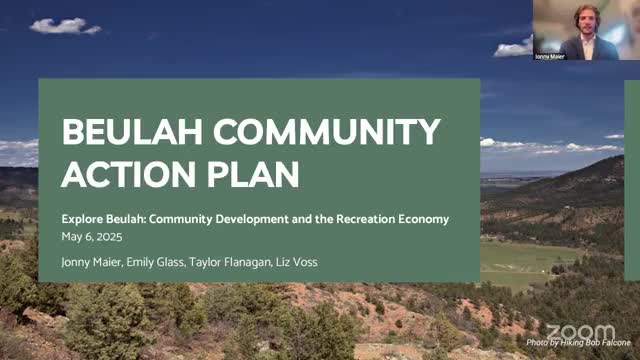CU Boulder students present Beulah Community Action Plan; Palmer Land Conservancy pledges support for conservation easements
Get AI-powered insights, summaries, and transcripts
Subscribe
Summary
Graduate students presented a Rural Technical Assistance Program (RTAP) Community Action Plan developed with Beulah residents; Palmer Land Conservancy said it is pursuing permanent conservation easements for Pueblo Mountain Park and private properties and will assist with funding and outreach.
Graduate students from the University of Colorado Boulder presented a Community Action Plan developed for Beulah under the Rural Technical Assistance Program (RTAP), and a local land trust said it will back conservation steps the plan recommends.
Amanda Hobson, deputy director, introduced the CU Boulder Master of the Environment students who led the RTAP planning effort for Beulah. Johnny Meyer, Emily Glass, Liz Voss and Tayla Flanagan described a three‑phase RTAP process, community engagement that included an in‑person workshop with roughly 80 participants at Horseshoe Mountain Lodge, and four community goals: balancing outdoor recreation with natural‑resource stewardship; sustainable and resilient local economic development; downtown infrastructure and maintenance; and increased community awareness and engagement.
The students walked commissioners through sample action tables for items such as conservation easements on private lands, a needs assessment for local businesses, a potential recreation center with evacuation capacity, wayfinding and signage, and installing electric‑vehicle charging at the general store and the mountain park. The planning team said it would finalize the Community Action Plan for the Beulah steering committee by May 9 and provide a copy to the commissioners via Pueblo County Parks and Recreation; Colorado State University Extension will provide implementation support for 12–24 months.
Dylan O'Hare, senior conservation manager with Palmer Land Conservancy, said his organization is prepared to support actions 1.1 and 1.2 in the plan: permanent protections for Pueblo Mountain Park and strategic private properties. "We're committed to supporting goals, 1.1 and 1.2, permanently protecting Pueblo Mountain Park and then strategic private properties that make up the heart and soul of Beulah," O'Hare said. O'Hare described Palmer Land Conservancy's experience holding conservation easements on roughly 40,000 acres in Southern Colorado and said the organization is already in early discussions with several private landowners in Beulah about voluntary, perpetual easements.
Commissioners expressed support and emphasized funding as a primary constraint. County staff and Palmer discussed steps for conserving Pueblo Mountain Park, which O'Hare said is city‑owned and that Palmer is developing a funding strategy to offer conservation at "no cost" to the city, subject to city council review. O'Hare confirmed conservation easements are perpetually tied to the land and that recording is public; he said the land trust works with landowners to determine how, and whether, new easements are publicly promoted.
Next steps described in the meeting: the planning team will deliver the finalized community action plan to the steering committee by May 9; Pueblo County Parks and Recreation will provide commissioners with the plan; and Colorado State University Extension will offer implementation support for the next 12–24 months. Palmer Land Conservancy said it will continue outreach to private landowners and pursue funding for a conservation easement for Pueblo Mountain Park, subject to city council process for a city‑owned parcel.
The transcript records multiple public‑comment style supportive remarks and no formal vote on the plan or on any funding commitment by the county during the session.
